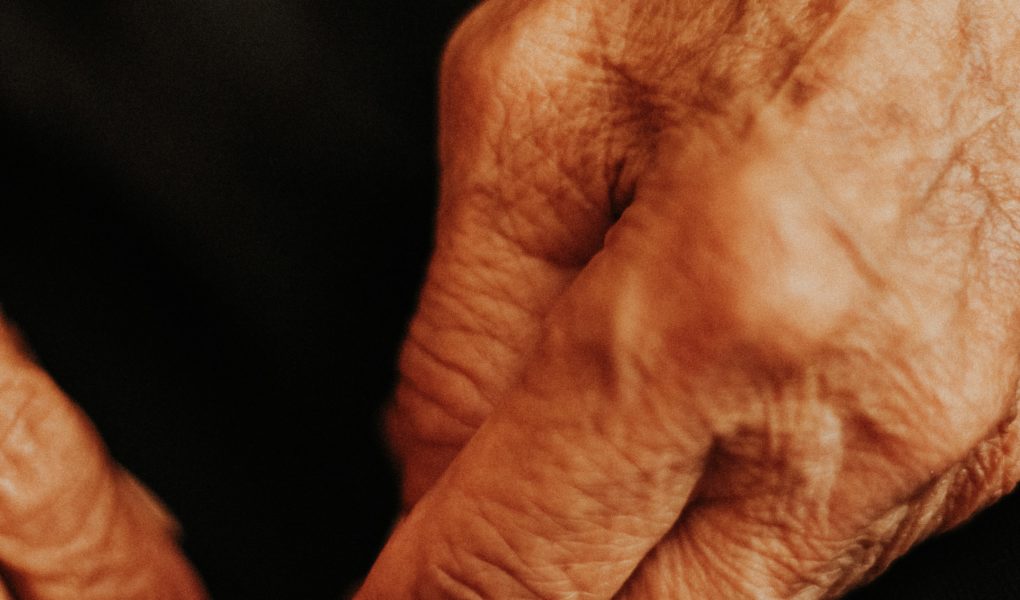“Why does Grandpa’s hands shake so bad?” my daughter asked after dinner. We hadn’t seen my dad in a few weeks and the symptoms of his Parkinson’s disease were already evident. His hands were shaking so bad that his green beans kept falling from his fork. After dinner, while watching Wheel of Fortune, I glanced over several times and noticed him holding his hands together in an attempt to subdue the shaking or to shield his shaking from prying eyes.

How you feeling, Dad? What the Doctor say, Dad? Did you eat today, Dad? Are just some of the questions I want to ask my father during our twice a month phone calls. Already knowing the standard answers: “Fine; Not much & Food”; I sometimes hope that he’d miraculously get talkative and say how he’s really feeling or the truth about his eating habits.
With my parents living in 400 miles away, it’s hard to judge between what warrants a visit and what warrants an extra phone call. The thing is, y’all, when your parents hit a certain age they stop telling you stuff. They don’t tell you that it’s getting harder to get up in the middle of the night to go to the bathroom. They don’t tell you that their medication price went up, so they have less money for food. They don’t tell you that they their vision is fading and they can’t really see that center line in the road.
It’s at these times, that we, adult children of elderly parents, hone all the investigative skills learned from Hotch of Criminal Minds and the charm of Abby of NCIS to find out what’s really going on. For example, instead of asking “Did you eat today?”, I’ll say, “For dinner tonight, I cooked lasagna, what did you have for dinner?” When I visit, instead of sitting on the couch, catching up on family gossip, I’m looking in the pantry, checking expiration dates, looking in the fridge to see if it’s stocked or subtly riffling through the kitchen trash to see …well, you never know what you’ll find. Stop judging!

The funny thing is, I can still see my parents as the adults they were in my youth. My dad was an avid Harley Davidson rider and I remember him on his orange and black Harley Davidson 1000. My mom also rode, but her bike was waaaay smaller, maybe a 500 series. They’d take us on these bike rides down the twisty, curvy back roads of our small country town. What fun that was!
I cherish those childhood memories and those memories anchor my resolve to play amateur detective when dealing with my elderly parents. As I embrace my 50s, I understand the desire to shield my own kids from the small un-comfortableness that comes with age. So, I am aware that as my parents are embracing their 70s, their shields are still in place. I respect that, but when does it stop?
When do we, adult children of elderly parents, step in to become caregivers or even consider an assisted living situation? I know it’s all on a case by case basis because people age differently. There are some 80-year-olds who are living at home and thriving, but on the other hand, I see some 75-year-olds who clearly shouldn’t be living alone, but don’t have anyone to take care of them. After some research, I’ve found these 5 ways to tell if your parents are ready for assisted living:
- According to Aging.com, the most important thing to consider with your loved one is their ability to take care of their own activities of daily living (ADLs). This includes things such as bathing, toileting, dressing and feeding. The ADLs are just the basics because we all know there’s more to life than self-care.
- Are they still able to pay the bills, clean the house, or leave the house for socialization? These are called Instrumental activities of daily living (iADLs). On my visits to my parents’ home, I’m using my television investigative skills to find out these things because it may cause some embarrassment if it were openly discussed.
- Do they have a medical condition that requires constant care? It is reported by AARP that more than 70 million people (aged 50 and older) have at least one chronic medical condition, and these can be debilitating issues like Alzheimer’s disease or heart disease. I think it is also important to think about where they are in the disease process. Is it a new diagnosis with a slow progression or a disease that progresses more quickly?
- Are your elderly parents able to think abstractly and handle things like paying bills or ensuring their own safety? Can they lock the doors to ensure safety in their home? Are they able to call for help if the situation arises? These are not conditions that you can ascertain with a phone call. That’s why it is important to “lay eyes” on your elderly loved ones periodically.
- Mental health issues are also a concern for our elderly parents. According to the National Alliance on Mental Illness (NAMI), many elderly people and their families don’t recognize the symptoms of depression, aren’t aware that it is a medical illness and don’t know how it is treated. They may think of depression as a character flaw and are worried about being teased or humiliated. Another thing to consider is that depression in the elderly may look different. They elderly may exhibit these symptoms: memory problems • confusion • social withdrawal • loss of appetite • weight loss • vague complaints of pain • inability to sleep • irritability • delusions (fixed false beliefs) • hallucinations.

I laugh sometimes when I think of my children playing television detective as I reach my parents’ age. I’d like to think that they wouldn’t have to, but I know the apple doesn’t fall far from the tree and I’ll probably try to shield them from my discomfort as well. The thing that I’m cautiously aware of is that time is a precious commodity and our elderly parents will not be around forever. If I have play detective to make the time they have left a little more comfortable, well just call me Olivia Benson!
Do you play detective with your parents? Tell me about it in the comments.






Thank you so much, this brought tears to my eyes. While my parents are in their early 60’s, this made me think of my grand parents and how I have been wondering when will be a good time for them to leave their home. As I call them, I always get the same answers… and I know my parents are taking excellent care of them, but distance makes it so hard to really understand what they are doing through!
This was very hard to read in that I found myself crying. It’s so hard when our grandparents or parents get so sick that we can’t do anything for them anymore. There may come a time when assisted living or nursing is needed. My grandfather recently made the transition after my grandmother died. He’s glad he went because he knew my father, an only child, just couldn’t cope by himself, especially while grieving his mother and father in law. But it’s still sad to see.
These are great things to think about. Thank you for a great list!
Here in the Philippines, we don’t have assisted living for the elderly. If ever, we just hire caregivers while the elders stay at home.
Oh I’ve read this post with so many emotions and interest, thank you for sharing it. It is a great topic to think about! – Paolo
It’s a difficult thing to think about but we got to be realistic and consider the best quality of life for our loved ones. Thank you for this.
I think for most…it is hard to accept your life changing. No more driving, do not have the energy to clean the house, make dinner, etc. But, they also do not want to be treated like children…by their children. It is a hard topic to discuss…but, you did a great job at it!
It can be so hard to take care of our aging parents. Hard in more ways than one. It is scary to think about that time.
These are awesome tips and a great list of things to be on the lookout for, thank you for sharing them
This is such a tough subject for our home. My parents are pretty independent. Hope they stay this way for a while longer.
It was hard to read even if it’s a useful post. Lost my dad 3 years ago and I haven’t recovered yet.
These are some great things to look for when deciding if they’re ready. This is such a tough transition! Good luck to you when dealing with your parents like this!
This is a really great article. My grandmother recently passed after years of having to be in assisted living. When she was younger, she was so independent so it was hard to hear how she was unable to do all of the things that she loved as she got older. My Aunt was wonderful about taking care of her and advocating for her with the staff who worked at her assisted living community.
I have not gotten to this with my parents, but we are doing this exact same thing with my husband’s grandmother. Every Sunday, we are checking her refrigerator, etc. I think the secrete ‘investigator’ is such a good route to go because you don’t appear to be interfering with their independence (if that makes sense!)
Thank you so much for the tips. I’m sure many will find these and use it as a guide. My parents are both deceased now but we did have assisted living when they turned 70.